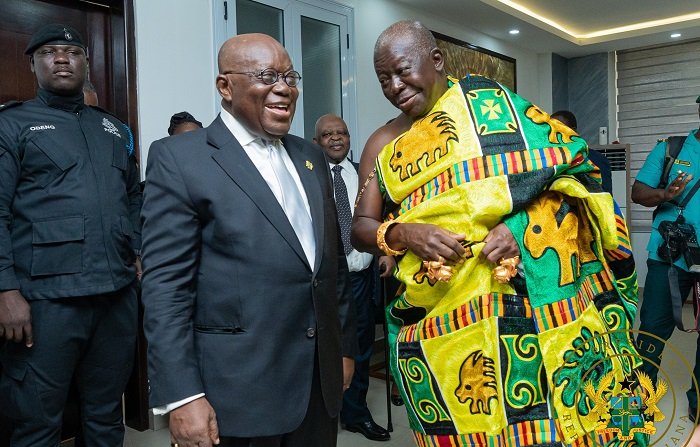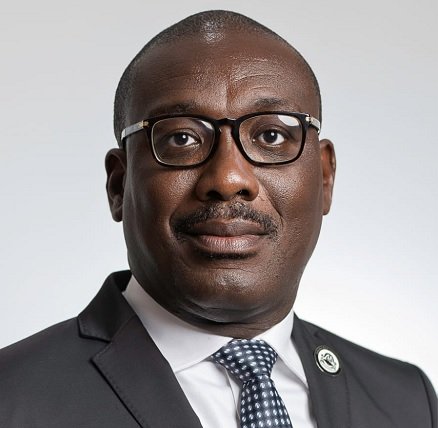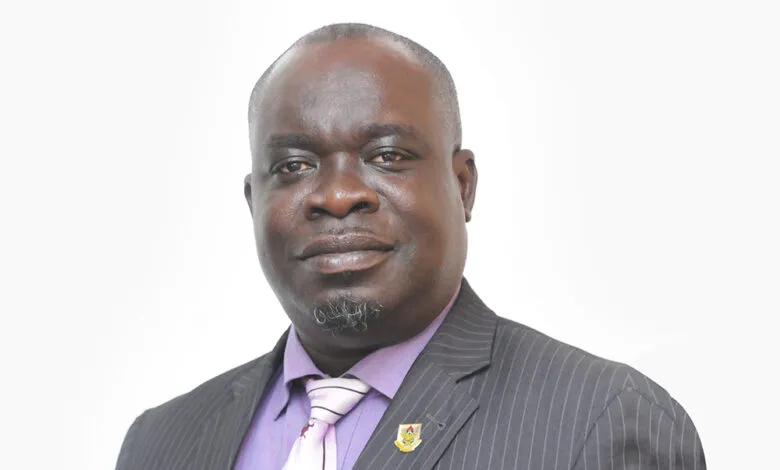Pressure is mounting on the government to immediately combat illegal mining (galamsey) as the devastating impact of the practice on river bodies, water supply, environment, health and agriculture, worsens.
The Asantehene, Otumfuo Osei Tutu II, the University Teachers Association of Ghana (UTAG) and the Ghana Bar Association (GBA) are the latest to add their voices to calls by Civil Society Organisations and individuals for prompt action.

President Akufo-Addo (left) interacting with Otumfuo Osei Tutu II
KINGSLEY E.HOPE reports that at a dinner with the Ghana Bar Association (GBA) at the Manhyia Palace in Kumasi on Monday, Otumfuo Osei Tutu described the situation as “embarrassing” and called for urgent action.
“In fact, on my way to Cape Coast to grace the Oguaa Fetu festival, I stopped at the River Pra. I’m afraid I have to tell you that what I saw there was so embarrassing. As a nation, how can we allow this to happen to us? I don’t know, but we have to fight this—no matter what,” he stated.
“As I see it, if an individual poisons the water source of a community, they are liable for the consequences under the law. What does the law do when one pours mercury into the same water supply, knowing fully well it can kill?” he queried.
Otumfuo expressed disappointment over the ongoing environmental degradation and called for collective efforts from all sectors of society to address the crisis.
He said it was time for organisations like the GBA, the Ghana Medical Association to unite and lead a national campaign against illegal mining.
At the opening of the GBA Conference earlier in the day, the Association’s President, Yaw Acheampong Boafo, reminded President Nana Akufo-Addo of his promise to put his presidency on line in the fight against galamsey,

Yaw AcheampongBoafo, GBA President
He noted the situation had rather worsened and stressed the need for immediate action to end the menace and also protect Ghana’s natural resources.
Incensed by the wanton destruction of river bodies, UTAG has threatened to embark on a nationwide strike by the end of this month if a total ban is not imposed on prospecting for gold and other minerals in forest reserves, farms, and rivers.
A statement issued by the association on Monday, said the ban was necessary because other government-led efforts to combat galamsey had failed as the practice continues with impunity.
Signed by the leadership of 13 branches of UTAG, it said the current state of illegal mining was distressing, with experts cautioning that the nation may import potable water within six years if urgent measures were not taken.
The statement said due to the devastating impact of galamsey, cocoa productivity had declined by 45 per cent this year with an estimated annual loss of $2.3 billion to the economy.
Additionally, it said the Forestry Commission reported that over 2.5 million hectares of forest cover had been permanently destroyed, while the Ghana Health Service had identified a 35 per cent rise in respiratory diseases in mining areas.
The statement noted that the ban on mining in forest reserves, farms, and rivers was necessary to safeguard the future of Ghana’s youth and chart a sustainable path to development.
The statement further urged all Ghanaians to support the campaign for a total ban on mining in these sensitive areas.

Prof. Charles Marfo, UTAG President
CSOs and imminent personalities who have called for immediate action on galamsey since last week include the President of the Bono Regional House of Chiefs, Osagyefo Oseadeyo Agyemang Badu II, who doubles as the Dormaahene and also serves as a High Court Judge.
Others are the founder of the Media Coalition Against Illegal Mining, Kenneth Ashigbey; Alliance for Empowering Rural Communities (AERC) and founder of the Perez Chapel International, Archbishop Charles Agyinasare.
It is recalled that the Ghanaian Times reported last week that the Ghana Water Company Limited (GWCL) in the Central Region was facing water supply challenges in Cape Coast, Elmina and surrounding communities.
The company attributed the challenges to reduced raw water intake at the Sekyere Hemang Water Treatment Plant (WTP), caused by illegal mining activities in the catchment area.
